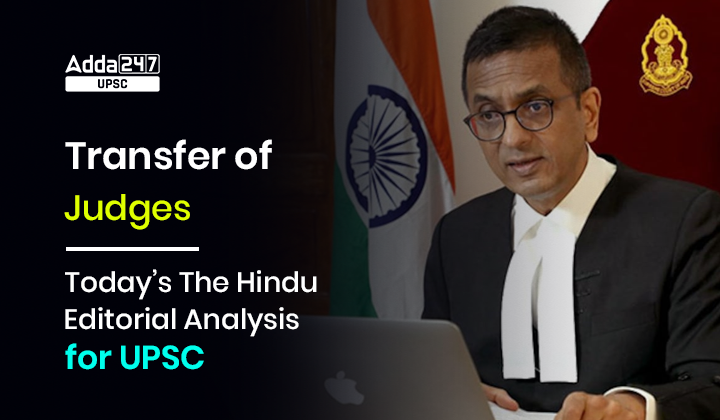Table of Contents
Relevance of the Issue of ”Transfer of Judges” for UPSC CSE
Transfer of Judges: The issue of Transfer of Judges covers UPSC CSE Mains’ GS 2: Judiciary & Indian Constitution
Why the issue of Transfer of Judges in news?
Lawyers recently raised the matter of the transfer of a Gujarat HC judge (Justice Kariel) to the Chief Justice of India (CJI), citing rumours that the Gujarat HC Chief Justice was uninformed of the impending transfer.
Also Read:
Issues in the Collegium’s Functioning
Constitutional Provisions on the transfer of judges
- Article 222 of the Constitution deals with the transfer of judges and states that the President may, after consultation with the Chief Justice of India (CJI), transfer a judge from one high court to another.
- This article has been subject to extensive judicial review and interpretation and recalling the historical context may be helpful to understand its present-day usage and contours.
Also Read:
Need for Transparency in Transfer of Judges
What is the existing Memorandum of Procedure on Transfer of judges?
- The Memorandum of Procedure is clear that a judge’s consent is not necessary to effect a transfer.
- The current norm is that all transfers ought to be in public interest, that is, for better administration of justice throughout the country.
- It also says the personal factors of the judge, including his preference of places, should invariably be taken into account.
- No one knows if these requirements are fulfilled in each case.
Also Read:
The Working of Supreme Court Collegium

Landmark Judgements of the Supreme Court on Transfer of Judges
1. Sankalchand H Sheth case
- The 1970s witnessed the supersession of multiple judges in the appointment of the CJI and also the transfer of several High Court Judges.
- Post-Emergency, a five-judge bench of the Supreme Court interpreted Article 222 in the Sankalchand H Sheth case.
- While concurring with the majority, Justice P N Bhagwati held that the transfer of a judge from one court to another inflicts many injuries on the individual.
- He noted that the consent of the judge proposed to be transferred was part of the scheme and language of Article 222.
- He also held that if the power of transfer is vested solely with the executive, it undermines judicial independence and eats into the basic features of the Constitution.
2. First, Second and Third Judges’ Cases
- These three cases interpreted Article 222 and its working.
- Cumulatively, the First and Second Judges’ cases resulted in the formation of the Collegium System by interpreting “consultation” with the CJI to really mean “concurrence”.
- Such concurrence is of the Supreme Court as an institution and is arrived at by the CJI upon discussion with the two senior-most judges.
- The Third Judges’ case expanded the collegium to include the five senior-most judges, including the CJI.
K Ashok Reddy case
- In 1994, between the Second and Third Judges’ cases, the K Ashok Reddy case was filed in the Supreme Court dealing specifically with the question of transfer of judges of high courts.
- The contention raised therein was that such transfers were likely to be influenced by “extraneous considerations leading to arbitrariness resulting in erosion of the independence of the judiciary”.
- This case also held that the power of transfer can be exercised only in “public interest”, for promoting “better administration of justice throughout the country”.
Is it time to re-examine some of what the three-judge bench held in K Ashok Reddy Case?
- The view was taken by Justice Bhagwati 44 years ago in the Sankalchand Sheth case as regards transfers was perhaps the correct one with greater applicability in today’s time.
- If transfers are based on “public interest” then the public has a right to know such reasons.
- It should be material that is considered before or when the transfer of a judge is being deliberated be shared with the concerned judge and all stakeholders.
- One can understand that sometimes this material may embarrass the judge. But a balance surely can be struck.
- When reasons for transfer are not known, it leads to speculation that only “inconvenient” judges get transferred.
What next?
- Transfer of judges may be needed for exchange of talent across the country and to prevent the emergence of local cliques in the judiciary.
- However, the power of transfer has always been seen as a possible threat to judicial independence.
- No good message is being sent if it is perceived that the Collegium heeds the demand made by one set of lawyers, but ignores that of another group.
- Even under the Collegium system, it seems it is difficult to dispel the impression that the threat of transfer hangs over every judge’s head. As the Memorandum of Procedure on transfer of judges is clear that a judge’s consent is not necessary to effect a transfer.
- In this situation, time may have come for a complete review of the provisions for transfer of High Court judges.
Also Read:
Collegium System for the Appointment of Judges
Conclusion
When the judiciary misses no opportunity to uphold the basic structure doctrine and preserve at all cost its independence, there is a need for transparency in judicial functioning to dispel all notions of favoritism, bias or governmental interference. It is not just in the “public interest” but also for the larger good of the judicial institution.
FAQs
Q. Which article deals with the issue of transfer of judges?
Ans. Article 222 of the Constitution deals with the transfer of judges and states that the President may, after consultation with the Chief Justice of India (CJI), transfer a judge from one high court to another.
Q. What does existing Memorandum of Procedure says about consent before transferring a judge?
Ans. The existing Memorandum of Procedure on transfer of judges is clear that a judge’s consent is not necessary to effect a transfer.
Other Important Articles from Polity & Governance Section:



 TSPSC Group 1 Question Paper 2024, Downl...
TSPSC Group 1 Question Paper 2024, Downl...
 TSPSC Group 1 Answer key 2024 Out, Downl...
TSPSC Group 1 Answer key 2024 Out, Downl...
 UPSC Prelims 2024 Question Paper, Downlo...
UPSC Prelims 2024 Question Paper, Downlo...





